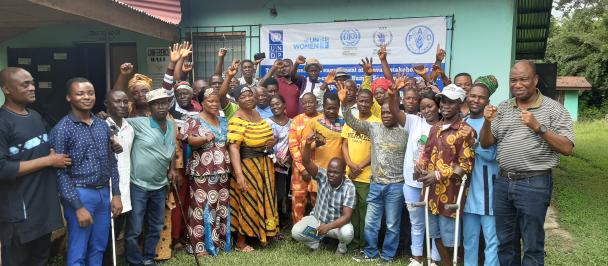CHAP planted seed rice for lowland agro-ecological zones on 5 hectares of land in Montserrado county using a technology known as System of Rice Intensification (SRI).
A recipient of UNDP’s agricultural grants has launched commercial seed rice, which is expected to increase local rice production and reduce reliance on rice imports.
The Community of Hope Agriculture Project (CHAP) launched the commercial seed rice following a successful harvest in Montserrado County. The seed rice is part of the “I Love Liberian Rice” campaign to improve and scale up rice production in Liberia.
“We have come a long way in achieving this goal. Despite the many challenges including losing our crop twice due to flooding, hard work and resilience have landed us here,” says Robert Bimba Executive Director of CHAP.
Launching CHAP’s commercial rice seed, Vice President of Liberia Jewel Howard Taylor urged young people to take advantage of opportunities in the agriculture sector to ensure that Liberia is able to feed itself. “Eat what you grow and grow what you eat,” she stressed.
Madam Howard Taylor mentioned that the vision and the mission of the government is to see Liberia tackle food insecurity by removing politics from the agriculture sector. “It is time for all Liberians to unite and forge a common goal of turning our rich soil into massive possibilities for employment and better livelihood,” the Liberian Vice President noted.
She pledged the government’s commitment to ensure that farmers are equipped with adequate tools and incentives to spur growth in the agriculture sector, noting that ways must be found to make the price for Liberian rice more affordable to everyone.
“We take note of the challenges related to land issues, proper storage, and floods but are excited to see that despite all of these challenges, CHAP has been able to turn what seemed to be a little opportunity into what could become a big investment,” the VP emphasized.
CHAP is one of eight agricultural organizations awarded grants by UNDP’s Livelihood and Employment Project in 2021 to develop innovative, sustainable and viable agricultural initiatives to boost agricultural production.
The five-year project is being undertaken in partnership with the Ministry of Commerce and Industry (MOCI) and the Ministry of Agriculture (MOA) and seeks to engage poor and vulnerable people in socioeconomic activities that generate income and improve their livelihoods. It targets women, youth and persons living with disabilities who are often at the worst end of the economic ladder.
The organization planted seed rice for lowland agro-ecological zones on 5 hectares of land in Montserrado county using a technology known as System of Rice Intensification (SRI).
CHAP is a focal organization of the System of Rice Intensification and the national executing entity for climate resilient rice production. Its current harvest will be able to provide commercial seed to 400 small-scale farmers from the current harvest. They will expand production to 100 hectares in Montserrado producing three crops of seed every year.
CHAP is a lead promoter of the System of Rice Intensification (SRI) principles, which embrace sustainable agricultural production techniques that do not degrade the environments. The effort is intended to make farming a more profitable business for smallholder farmers.
Also speaking at the launch, UNDP Resident Representative Stephen Rodriques stressed the need to scale up support to small farmers and cooperatives as part of efforts to eliminate extreme poverty, and end hunger and malnutrition in Liberia.
“Making quality farm inputs available can play a major role in spurring development, reducing food insufficiency and poverty, by providing work to the unemployed men, women and youth of the country,” said Rodriques.
He said the country should invest in research and extension systems in order to drive agricultural transformation and ensure that households have access to good agriculture inputs that can produce enough, high quality nutritious food.
“We must empower local farmers to use climate-smart agricultural practices like the rice intensification technology that has been used to produce this batch of seed rice in order to safeguard farmer investments from climate change,” the UNDP Resident Representative noted.
Mr. Rodriques said UNDP is committed to putting more investment into this program, which shows the importance of small farmers. ‘I am excited to see how CHAP has been able to use a small grant to achieve something big’.
The agriculture sector in Liberia is largely undeveloped and with low yields due to several factors, including under-investment, limited access to affordable inputs and implements, and proper storage facilities.
Despite having the highest annual per capita consumption of rice (133Kg/year) in Africa, Liberia only produces 40% of its local rice needs, importing 300,000 metric tons a year, at a cost of US$ 200 million.

 Locations
Locations
